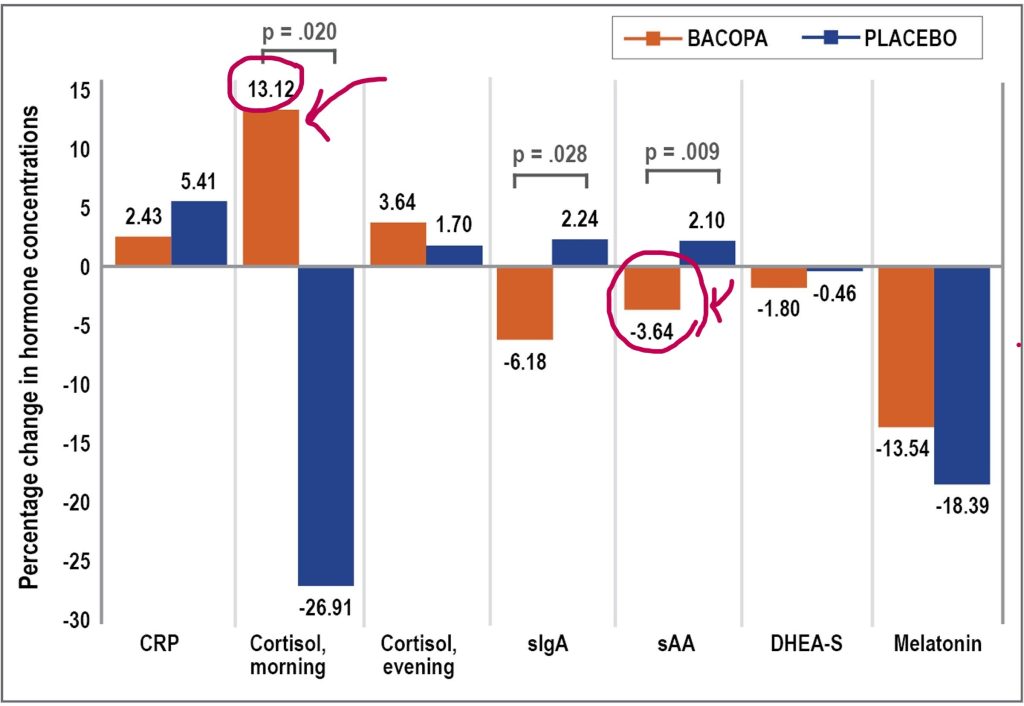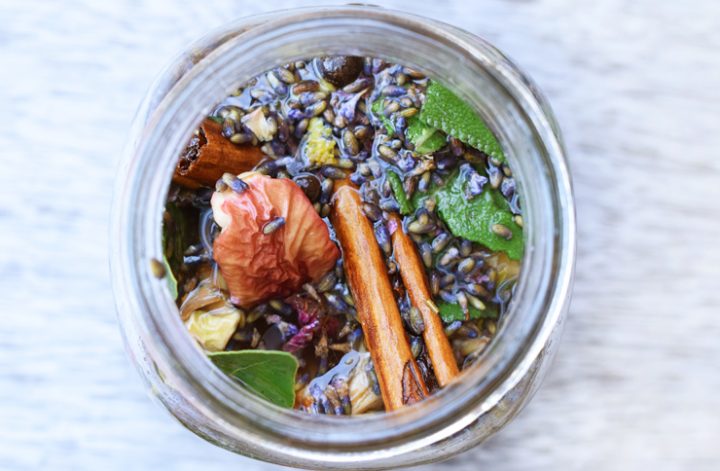I always say ‘don’t hate your hormones’, because at the base of all hormone conditions is a body that’s just trying to cope, protect itself and regain balance and cortisol is a great example of a hormone that’s struggling in our modern world. I’m going to share with you a naturopathic (and a human) perspective on excess cortisol as we put together the pieces of what ‘cortisol belly’ is, what causes it and what herbs you can use to assist you in regaining normality in your cortisol levels
Does stress cause high cortisol?
Actually stress only temporarily increases cortisol. In a normal healthy body stressors like work pressures, family conflict, self-imposed perfectionism, a bad day for whatever reason will drive up your stress hormones (cortisol included) but once the stress abates those hormones levels return to baseline. This is what we call a healthy adaptive response to stressors whether they be psychological, mental, physical or environmental.
So what causes high cortisol over the longer term? The answer is distress causes high cortisol. Psychological distress is where the emotional and physical impact of prolonged stresses start to impact the activities of your daily life, because of things like persisting high stress hormone secretion. 15% of Australians aged 16-85 experience high levels of psychological distress with females being more prone to it than men in the 16-34 yr age bracket (26% compared to 14%). Psychological distress is a real concern for women. (AIHW 2024)
Here are the symptoms of psychological distress according to the K10 (Kessler Psychological Distress Scale):
- Fatigue or tiredness with no good reason
- Nervousness
- A level of nervousness where nothing can calm you down
- Hopelessness
- Fidgeting or restlessness
- Restless and unable to sit still
- Depression
- Everything feels like an effort
- So sad that nothing cheers you up
- Worthlessness
Scoring high on the Kessler Psychological Distress Scale can suggest the presence of depressive or anxiety disorders. (Andrews and Slade 2011)
According to a 2024 systematic review the prevalence of anxiety is increasing with more than 4% of the global population suffering from some sort of anxiety disorder. (Saadatmand et al 2024)
What is cortisol and why does it make my belly fat?
Cortisol is a stress hormone released by the adrenal glands in response to stress triggers and it creates a sense of vigilance and alertness in your body and mind. So in normal stress responses it’s a critical survival hormone and keeps us aware and responsive so that we can run from danger or at the least notice dangers and become reactive to them. Beyond these instant responses cortisol is involved in our sleep wake cycle, helping us feel awake and alert in the morning and normally it lowers at night to help us sleep.
Once you move into unhealthy distress territory, cortisol may not feel like your friend anymore, it might actually feel like an anxious, reactive, tensing voice in your head that you can’t settle. And go back to those ten symptoms of psychological distress….a lot of them can feel like elevated cortisol. I’m always on the lookout in consultations for signs like these that can indicate high cortisol:
- Clients saying they can’t settle their minds at night
- Loud voice when speaking
- Rapid speech
- Anxiety
- Panic attacks
- Waking in project management mode too early in the morning
- Constant fidgeting
- Constantly moving legs while sitting
And they’re just the things I might see, I can also feel in the pulses and tongue where there is a heightened stress response and all over tension in the body. And the one class of herbs that I always (always, without fail!) prescribe to clients with high cortisol is a class called nervines. They settle the nerves, calm down that nerve cell excitability and help you feel calm and safe. Because that’s another thing about cortisol, it can be a reflection of not feeling safe because the evolutionary purpose of cortisol is to keep you away from harm. It’s designed to do this several ways:
- By shunting blood to your heart and lungs so you can get moving quickly
- By suppressing digestion and other restorative processes in your body so you can favour muscle activation and push more energy to get moving quickly
- By making you extremely vigilant and alert so that you can notice dangers and move away from them quickly
- And I’ll propose this one too, by encouraging the deposition of fats in the midsection of your body so that you have extra physical layers of protection from injury and trauma and this also leads to energy storage in the form of accumulated fat. This is how excess cortisol makes your belly fat.
Read on to find out what strategies and herbs can help treat cortisol belly.
The best way to reduce chronically elevated cortisol is to regularly de-excite your nervous system

As far as high cortisol goes there are a few things I’ve noticed over years (about two decades) of working with hormones like this one. Not every meditation technique works. Because it’s not just about feeling relaxed. You can regularly practice a calming meditation but feel like you’re getting nowhere with chronic subliminal and unabating stress. And to understand why….. we need to go back to evolution. Remember this:
Cortisol is dead serious about its role as a survival hormone. It keeps you safe.
Cortisol won’t calm down until you feel safe. Literally. So the meditation technique that you practice needs to make you feel safe, not just make you calm for 30 minutes. Look for meditations loaded with positive affirmations, assurances about how well and healthy you are, reminders that you’re safe and loved. Like this one by Tammy Lodge. Once that messaging starts getting through, the cortisol levels will calm down. I also recommend my Loving Compassion Guided Meditation.
Another way to approach this is with Vedic Meditation, a technique that unwinds layer upon layer of stress from the body in a gentle and effortless twice a day 20 minutes practice. What can I say, I’m a bit of a fan. I’ve been a Vedic meditator for more than two years now and it’s really (really!) helped me with anxiety and stress.
Vedic Meditation teacher Dan Snow recommends a regular twice daily practice of Vedic Meditation as an easy and natural way to calm down high cortisol. “Rest is the main antidote to stress, and during a 20 minute Vedic Meditation practice, the body achieves a state of rest, far more profound than at any stage during a night’s sleep. This lowers the baseline cortisol levels in the body, allowing us to stay calmer and think clearly in the face of potential stressors. When Vedic Meditation is practiced regularly, the body also returns to baseline cortisol levels more rapidly when the stress response is triggered, meaning we don’t stay in a stressed state.
“Over time, we increase our resilience and ability to cope with everyday demands. When elevated cortisol levels reduce our ability to cope with the ever changing demands of the world around us, rest and adaptability are a foundational need. Both of which Vedic Meditation provides.”
And what I love about this approach is it works with your body’s innate intelligence by normalising cortisol, not just reducing it for the sake of reducing it. When you allow your body to organically modulate hormone levels it’s always going to return you to healthy hormone function, and not push you into imbalance. I highly recommend doing a Vedic Meditation course and using this technique for stress control. You can find out more about Dan here: www.dansnowmeditation.com and follow him on the socials too. I popped the links below.
Herbs that help lower cortisol and reduce cortisol belly
Okay so what’ I’m about to share with you is secret naturopath business! While some of it may feel like a lot of big words, it’s just that health conditions aren’t always simple. They’re nuanced and layered. I’ll do my best but remember it’s always best to consult a professional if you’re thinking of using herbs. Like myself, a naturopath, herbalist or similar. Don’t be shy, reach out here.
Ashwagandha (Withania somnifera)

Making a tincture with Ashwagandha root here which I will use for sleep and nervous system restoration. (Sze 2024)
Ashwagandha is a strengthening herb that is classed as an adaptogen. These sorts of herbs are used to restore normal physiological functioning to body systems and organs when challenged by stress. It’s botanical name is a reference to it’s ability to assist with sleep (‘somnifera’ meaning to induce sleep). The Hindu name ‘Aswagandha’ is a reference to having the ‘strength of a horse’. It’s interesting how our cultural values shape our descriptions and understanding of herbs. In India Ashwagandha is a herb used often in young girls to build their feminine qualities and support strength for puberty, fertility and reproductive health so it makes sense to see it as imbibing in us the strength of a horse. In our Western culture where it seems, we’re all stressed out, we think of it as a hypnotic sedative. These are both wonderful qualities in the herb, but there’s a lot more to this plant.
It’s a Solanaceae family plant so it naturally contains alkaloids, the key alkaloids being the ‘withanolides’ and often herbal extracts will contain a standard level of these marker chemicals. They contribute to its many actions in the body including anti-stress, anti-viral, anti-inflammatory, antimicrobial, anti-cancer, anti-diabetic, anti-obesity, cardioprotective, and hypolipidemic properties. (de la Peña et al 2023)
Other chemicals in the roots (herbalists use the roots medicinally) include amino acids, steroids, volatile oil, starch, reducing sugars, glycosides, hentriacontane, dulcitol and withaniol. (Polumackanycz et al 2023)
A systematic review and meta-analysis of the benefits of Ashwagandha for high cortisol published this year found that in doses of 125-600mg daily for up to 3 months:
- Ashwagandha significantly reduced stress, anxiety, and cortisol levels compared to placebo in meta-analysis of 9 studies (558 patients)
- Aswagandha decreased perceived stress, anxiety and cortisol
- Aswagandha is safe with some some mild side effects noted.
Note: There are several studies on Ashwagandha and its metabolic effects and I’ve prioritised human trials. Any that are animal studies have been avoided where possible as the ethics of animal studies is questionable and they don’t genuinely reflect what happens in a human body.
Studies on Ashwagandha
- Studies have shown that an extract of Ashwagandha root containing 2.5% withanolides taken daily for 60 days reduced cortisol and increased serotonin in patients experiencing anxiety. (Majeed et al 2023)
- A 2020 study showed that Withanolides from Withania somnifera were a promising anti-viral treatment for COVID-19. (Khanal et al 2020)
- Another study tested nine withanolides for their effects on the cell surface receptor proteins (TMPRSS2) that SARS Covid-19 interacts with in order to gain entry into host cells. The withanolides inhibited these proteins and also downregulated their expression which is part of the anti-viral action of the plant. (Dhanjal et al 2021)
Overall, Ashwagandha supports healthy hormone function including increasing thyroid hormone secretion from the thyroid gland which benefits metabolism. It can normalise adrenal activity via it’s positive effects on the hypothalamus–pituitary–adrenal (HPA) axis which can reduce elevated cortisol levels. An important part of its ability to reduce cortisol is how it affect the pituitary gland which is a master orchestrator of bodily hormones. (Wiciński et al 2023)
Chamomile (Matricaria chamomilla)

Making a tincture of Chamomile flowers here that I’ll use to improve sleep depth and relieve stress. (Sze 2024)
An important aspect of how cortisol works that is often overlooked, is the fact that it’s a diurnal hormone that is naturally higher in the morning and lower at night. In cortisol excess conditions like cortisol belly though, your cortisol may not come down at night so the fat depositing effects of cortisol continue as you sleep. I use salivary cortisol testing to ascertain this, as well as careful questioning in consultations. There are lots of useful nervine herbs you can use to help regain that normal diurnal pattern of cortisol, and one of my favourites is Chamomile.
It’s been suggested that the flavonoid chemical apigenin in Chamomile has the ability to modulate HPA function by positively influencing neurotransmitter pathways (primarily GABA which produces calming effects). (Viola et al 1995) (Awad et al 2007)
It also has a modulating effect on the HPA axis function. It’s a wonderful sleep herb, anxiety reducer and also assists with digestion. According to a 2024 systematic review “Most studies showed that daily consumption of chamomile is effective in improving anxiety and no threatening or adverse side effects were reported.” (Saadatmand et al 2024)
A 2018 trial assessing the effects of Chamomile on cortisol levels in generalized anxiety disorder (GAD) over an 8 week period found improvements in morning cortisol levels (they increased), less severity of the anxiety symptoms as well as lower cortisol levels in the evenings. The improvement in night time cortisol was dependent upon an improvement in morning cortisol. What would this translate to you wonder? From a clinical perspective I’d expect to see:
- Better morning physical energy and cognitive function
- More stable energy levels through the day
- Less feelings of overwhelm
- Improved mood
- Increased stress tolerance along
- Easier transition into sleep at night
- Deeper sleep quality.
These might just be the changes you’re looking for to get you back to enjoying life to the fullest whether you’re dealing with cortisol belly or not. (Keefe et al 2018)
Bacopa (Bacopa monnieri)

I’ve always loved growing Bacopa. It’s easy to grow and makes for a pretty hanging plant. (Sze 2024)
If you haven’t discovered the joys of growing your own Bacopa yet, maybe I can convince you here 🙂 This is an adrenal tonic herb that herbalists use to enhance memory, focus, concentration and other aspects of cognition. It’s known actions include anxiolytic, antidepressant, sedative, and adaptogenic. With a long history of use in Ayurvedic medicine, Bacopa is THE best tonic herb for your home medicine garden because unlike a lot of other tonics (Ashwagandha, Licorice, Rhodiola for example) we use the leaves of Bacopa and not the roots. So there’s no need to spend years waiting for your precious plant to grow before you can harvest the roots, and then you have to start all over again. With Bacopa, you’ll have a steady supply of adrenal support year after year. It’s also known as Brahmi (but that can also be the name given to Centella asiatica, Gotu Kola)
So let’s look at the research on this one. A 2014 Australian double blind randomised controlled trial found Bacopa did many things that would ultimately assist in a condition of hyper-cortisolaemia like cortisol belly:
- It reduces cortisol levels
- It boosts cognition (nootropic)
- It lifts mood
- It reduces the perception of stress
Bacopa has been found to enhance mood, lift overall health and boost emotional well-being in a four week randomized double blind placebo controlled trial focused on sleep. The study used salivary cortisol testing as one of the measures, because high night time cortisol is a known cause of sleep disturbance. They also tested salivary alpha-amylase which is a marker of stress that is raised in times of stress and lowers in times of rest and calm. (Lopresti et al 2021)
As you can see in the chart below, the group taking Bacopa (in orange) had an increase in morning cortisol (13.12% increase, see the red arrow on the left) while the placebo group had a drop of 26.91%. How would a 26% drop in morning cortisol feel? You’d feel tired, foggy, fatigued possibly and definitely less able to focus and be productive. And that sets up a vicious cycle for elevated night time cortisol. So one important aspect of beating cortisol belly is this:
You’re not trying to lower cortisol completely all through the day, you’re trying to re-establish a healthy cortisol function and rhythm. It’s about normalising it.
The evening result does not appear so significant, perhaps over a longer treatment period this would be different? I often find in clinic when working with hormones it takes a few months to see significant improvements, that’s certainly true for regulating menstrual cycles.
Secondly, note the significant reduction in salivary alpha-amylase indicating lowered stress levels after treatment (3.64% reduction, see the arrow on the right) while that same stress indicator increased in the placebo group, those not taking Bacopa.
So in summary: Bacopa can improve morning cortisol and help you regain normal cortisol diurnal patterns, preventing high evening cortisol when your metabolism is much slower and the high cortisol will disrupt your sleep. It also lowers stress perception, improves mood and calms and seen by the reduction in apha-amylase levels.

Src: Lopresti, A. et al (2021). Effects of a Bacopa monnieri extract (Bacognize®) on stress, fatigue, quality of life and sleep in adults with self-reported poor sleep: A randomised, double-blind, placebo-controlled study. Journal of Functional Foods.
Remember, in previous studies one notable factor in improved cortisol control was the ability of a herb to elevate morning cortisol. This is the most important outcome in treatment because it contributes to greater normalizing of cortisol’s diurnal patterns (meaning, normal cortisol response and quicker recovery from stress).
According to a meta-analysis of nine quality trials examining the cognition boosting effects of Bacopa published in 2014, the positive effects of the herb relate to its ability to increase speed of decision making and cognition which I would suggest is a sign of increased ease of decision making. What does this have to do with elevated cortisol? Well, the thing about being in a stress state is that things can feel a little overwhelming, and inertia as well as difficulty making clear decisions could be a sign of distress. Admittedly, this study was more focussed on cognition. (Kongkeaw et al 2014)
A couple of studies (Zu et al 2017, Kumar et al 2016) that demonstrated beneficial effects of Bacopa on the HPA axis were animal tests and we can’t rely on that for an accurate prediction of its measurable effects in humans. Despite this, I know from years of using it in clinic and training in herbalism that it is a valuable herb for adrenal function, improving stress response and reducing high cortisol levels.
Other herbs that lower cortisol
There are so many herbs that loewr cortisol, and as research continues to emerge they’ll be picked up in studies. Herbalists will know about most of these because we’re trained in them for several years, in order to qualify to practice. Examples of such herbs are:
- Rhodiola
- Lemon Balm
- Valerian
- St Johns Wort
- Passionflower
For now, you might be on the lookout for a nice Ashwagandha latte or Chamomile tea. The doses we use in herbalism are specific to you and much higher usually than teas, so feel free to get in touch if you’d like to work with herbs on a more potent level with me. In the meantime, take care and enjoy those meditations!
Here are Dan Snow’s links for the soon-to-be Vedic Meditators out there (welcome to the community!):
- Website: www.dansnowmeditation.com
- Instagram: @dansnow_meditation www.instagram.com/dansnow_meditation/
- Facebook: https://www.facebook.com/dansnowmeditation
- LinkedIn: https://www.linkedin.com/in/dansnowmeditation/

p.s don’t forget to follow me on instagram, tik tok or facebook for more tips and insights into cultivating a healthy hormonal landscape in your body.
Cortisol Belly Weight Gain Series:
- Video #167 learn how cortisol and other related hormones are made Video link
- Video #168 learn about the impact of stress on your hormones including cortisol Video link
- Video #169 learn about how perimenopause and menopause impact cortisol and cause cortisol belly Video link
- Video #170 learn about the hunger hormone that contributes to cortisol belly Video link
If you want to work on your midlife weight/fat gain overall you might like to watch the recording of my FREE Midlife Weight Loss Tips for Women Webinar

Hey there! Welcome to my world of totally natural and powerful healing medicines. Medicines from nature. Medicine from Source. I’m a naturopath and herbalist with extensive clinical experience working with a range of health conditions including hormonal, metabolic, mental health, sleep and more.
I’ve brought together two decades of clinical and teaching experience working with women from puberty to menopause as well as academic skill and curiosity to bring you this blog. I hope you enjoy it!

References
- Andrews, G., & Slade, T. (2001). Interpreting scores on the Kessler psychological distress scale (K10). Australian and New Zealand journal of public health, 25(6), 494-497.
- Arumugam, V., Venugopal, V., Balakrishnan, A., Bhandari, R., Boopalan, D., Ponnurangam, R., … & Kuppusamy, M. (2024). Effects of Ashwagandha (Withania Somnifera) on Stress and Anxiety: A Systematic Review and Meta-analysis. EXPLORE, 103062.
- (No author.) Australian Institute of Health and Welfare. 2024. Stress and Trauma.
- Awad, R., Levac, D., Cybulska, P., Merali, Z., Trudeau, V. L., & Arnason, J. T. (2007). Effects of traditionally used anxiolytic botanicals on enzymes of the γ-aminobutyric acid (GABA) system. Canadian journal of physiology and pharmacology, 85(9), 933-942.
- Benson, S., Downey, L. A., Stough, C., Wetherell, M., Zangara, A., & Scholey, A. (2014). An acute, double‐blind, placebo‐controlled cross‐over study of 320 mg and 640 mg doses of Bacopa monnieri (CDRI 08) on multitasking stress reactivity and mood. Phytotherapy Research, 28(4), 551-559.
- de la Peña, I., Afable, T., Dahilig-Talan, V. R., & Cruz, P. (2023). Review of plant extracts and active components: mechanisms of action for the treatment of obesity-induced cognitive impairment. Brain Sciences, 13(6), 929.
- Dhanjal, J. K., Kumar, V., Garg, S., Subramani, C., Agarwal, S., Wang, J., … & Wadhwa, R. (2021). Molecular mechanism of anti-SARS-CoV2 activity of Ashwagandha-derived withanolides. International Journal of Biological Macromolecules, 184, 297-312.
- Joshanloo, M. (2023). Stability of symptoms of psychological distress: A 13‐year study using Australian national data. Stress and Health, 39(1), 219-225.
- Keefe, J. R., Guo, W., Li, Q. S., Amsterdam, J. D., & Mao, J. J. (2018). An exploratory study of salivary cortisol changes during chamomile extract therapy of moderate to severe generalized anxiety disorder. Journal of psychiatric research, 96, 189-195.
- Khanal, P., Chikhale, R., Dey, Y. N., Pasha, I., Chand, S., Gurav, N., … & Gurav, S. (2022). Withanolides from Withania somnifera as an immunity booster and their therapeutic options against COVID-19. Journal of Biomolecular Structure and Dynamics, 40(12), 5295-5308.
- Kongkeaw, C., Dilokthornsakul, P., Thanarangsarit, P., Limpeanchob, N., & Scholfield, C. N. (2014). Meta-analysis of randomized controlled trials on cognitive effects of Bacopa monnieri extract. Journal of ethnopharmacology, 151(1), 528-535.
- Lopresti, A. L., Smith, S. J., Ali, S., Metse, A. P., Kalns, J., & Drummond, P. D. (2021). Effects of a Bacopa monnieri extract (Bacognize®) on stress, fatigue, quality of life and sleep in adults with self-reported poor sleep: A randomised, double-blind, placebo-controlled study. Journal of Functional Foods, 85, 104671.
- Majeed, M., Nagabhushanam, K., & Mundkur, L. (2023). A standardized Ashwagandha root extract alleviates stress, anxiety, and improves quality of life in healthy adults by modulating stress hormones: Results from a randomized, double-blind, placebo-controlled study. Medicine, 102(41), e35521.
- Polumackanycz, M., Petropoulos, S. A., Śledziński, T., Goyke, E., Konopacka, A., Plenis, A., & Viapiana, A. (2023). Withania somnifera L.: phenolic compounds composition and biological activity of commercial samples and its aqueous and hydromethanolic extracts. Antioxidants, 12(3), 550.
- Saadatmand, S., Zohroudi, F., & Tangestani, H. (2024). The Effect of Oral Chamomile on Anxiety: A Systematic Review of Clinical Trials. Clinical Nutrition Research, 13(2), 139.
- Viola, H., Wasowski, C., De Stein, M. L., Wolfman, C., Silveira, R., Dajas, F., … & Paladini, A. C. (1995). Apigenin, a component of Matricaria recutita flowers, is a central benzodiazepine receptors-ligand with anxiolytic effects. Planta medica, 61(03), 213-216.
- Wiciński, M., Fajkiel-Madajczyk, A., Kurant, Z., Kurant, D., Gryczka, K., Falkowski, M., … & Zabrzyński, J. (2023). Can Ashwagandha Benefit the Endocrine System?—A Review. International journal of molecular sciences, 24(22), 16513.






